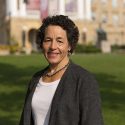La Follette School notes 25 years with special issue of policy report
The Robert M. La Follette School of Public Affairs is marking its 25th anniversary with an expanded issue of the La Follette Policy Report that showcases Wisconsin public affairs research.
Ten school faculty describe how their research informs public policy in Wisconsin in the just-released fall issue of the La Follette Policy Report, which demonstrates the school’s commitment to the Wisconsin Idea, the practice of extending UW–Madison’s boundaries to the state’s borders.
“The La Follette School of Public Affairs is engaged in so much research that relates to Wisconsin that we doubled the size of our usual Policy Report to celebrate our anniversary,” says school director Carolyn Heinrich. “From school choice to better health care coverage to the effects of welfare reform, our faculty are examining challenging issues and helping Wisconsin policymakers to design and understand the effects of public policy.”
The Wisconsin Legislature established the La Follette Institute of Public Affairs to provide research, public service and education to advance knowledge of public affairs and the application of that knowledge to the state’s needs. The 1983-84 academic year was the institute’s first.
Started 20 years ago, the Policy Report is a primary vehicle of the La Follette School for sharing domestic and international research by public affairs faculty of UW–Madison. Published twice a year in print and online, it is disseminated to policymakers, scholars and La Follette School alumni around the United States.
The issue includes brief discussions of research undertaken at the La Follette School that directly affects public policy:
- Heinrich on the effect of state policies on the accessibility and affordability of a pharmaceutical agent for treating alcohol addiction.
- Bobbi Wolfe on health care coverage for families leaving welfare.
- Andrew Reschovsky on the crisis in funding public education.
- John Witte on charter schools.
- Leslie Ann Howard and Kathy Hubbard on closing the racial achievement gap in third-grade reading.
- Donald Moynihan on the turnover of public employees.
- Dennis Dresang on a needs assessment for the Menominee Nation.
- Robert Haveman on the benefits of Section 8 housing vouchers.
- Maria Cancian on child support and how Wisconsin influenced federal policy.
- Geoffrey Wallace on child support and nonmarital childbearing.
Plus, Haveman explores the history of the Wisconsin Idea and the La Follette School’s role in practicing it; Heinrich looks at the history of the school; and outreach director Terry Shelton discusses public service partnerships and projects and students’ contribution to the Wisconsin Idea via the public affairs workshops.


